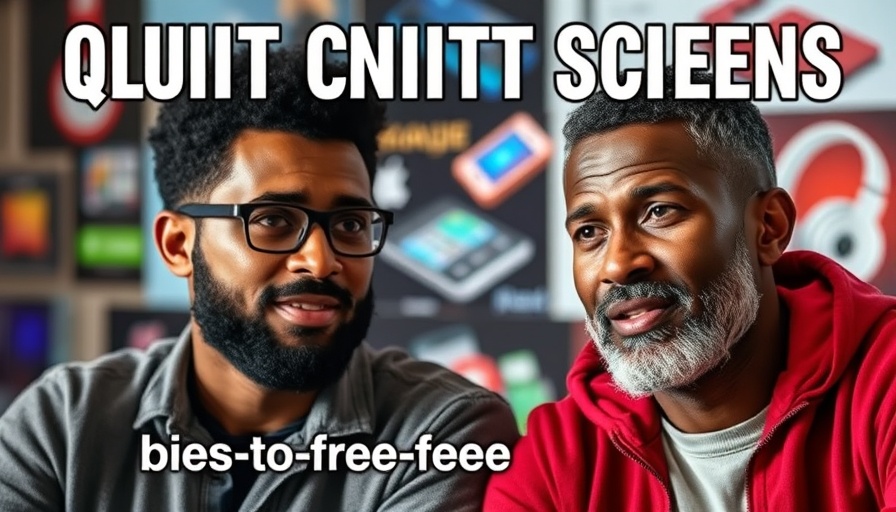
Is Our Digital Dependency Harming Our Brains?
When was the last time you went even an hour without checking your phone? Many of us can hardly remember. According to research, an average person taps, swipes, or clicks on their device around 2,617 times a day, with heavy users exceeding 5,400 interactions. This attachment to screens takes a toll on our lives; the average person now spends over seven hours each day in front of a digital display, potentially compromising critical aspects of mental health and cognitive function.
In '7 Screen Free Weeks to Improved Memory & Changed Brain,' we explore the transformative journey of disconnecting from screens, unveiling pivotal insights on memory improvement and mental well-being.
Seven Weeks Away from Screens: A Journey to Reconnect
In an eye-opening episode of the Quick Brain podcast, host Jim Quick interviewed Carlos Whitaker, who decided to take an extraordinary leap: disconnecting from screens for seven weeks. During this time, he lived alongside monks and Amish farmers, immersing himself in a world free from digital distractions. This period of complete immersion not only offered a reset for his mind but also led to profound insights about ourselves and our relationship with technology.
Why Silence Can Be Transformative
Whitaker's experience highlights a modern paradox; while technology connects us, it also isolates us from our own thoughts and feelings. In a society where solitude is considered intimidating, many have forgotten the importance of spending time in silence to reflect and re-center. Quick reminded listeners that before car radios or smartphones, humans were accustomed to traveling and existing in silence. He pondered why this fear of solitude exists and its significance in our lives.
Breaking Free from Digital Chains
Documenting his journey, Whitaker found surprising benefits. Through tests comparing brain activity before and after the experiment, he saw significant improvements in cognitive performance. Specifically, his memory soared from the 50th percentile to the 99th percentile for men in the U.S. — a remarkable change, demonstrating how disconnected living can lead to substantial cognitive advantages.
The Lost Arts of Wondering and Noticing
Whitaker emphasized several lost skills he rediscovered during his time away from screens: the art of wondering and the ability to notice the world around us. When we have immediate access to information via smartphones, we often forego curiosity — skipping to Google for quick answers instead of letting our minds wander. During his experience, Whitaker rediscovered the value of simply pondering questions without seeking instant answers, and he encourages readers to do the same.
Practicing Mindfulness with Meaningful Hobbies
To counteract the constant screen engagement, Whitaker has actively embraced hobbies that promote offline interactions — namely, pickleball and fly fishing. These activities not only provide a sense of community but also encourage human connections by engaging in meaningful, face-to-face interactions. By choosing hobbies that keep us away from screens, we can cultivate new friendships and deepen existing ones.
Practical Steps to Reduce Screen Time
For those looking to reclaim their attention spans and improve memory, Whitaker suggests taking small, meaningful steps. Begin by setting specific screen-free times each day, or even designating an entire day without screens—weekly, if possible. Establish boundaries for smartphone usage, such as keeping phones out of the bedroom at night or having designated times during the day when the phone is on “Do Not Disturb.” This approach empowers individuals to regain control over their relationship with technology.
The Role of Intentional Technology Use
In a stimulating discussion, Whitaker shared how the Amish prompted him to assess technology differently. Rather than rejecting technology outright, they evaluate whether new tools bring them closer together as a community or drive them apart. Adopting a similar perspective could help us integrate technology meaningfully into our lives without letting it dominate our day-to-day experiences.
Realizing Limitless Potential Through Personal Development
Ultimately, Whitaker’s experience serves as a bold reminder of the power we hold to redefine our understanding of connection. By disconnecting from the digital world, we may rediscover our senses, recall the joys of creativity, and realize our limitless potential. Remember: improving memory, focus, and personal development is a journey we can all embark on, one step at a time.
Call to Action: Start Your Journey to Reconnect!
If you feel inspired by Whitaker's insights, why not design your first screen-free day? Begin with just two hours, move up to four, and gradually work towards a full day of intentional living without digital distractions. Embrace this journey to rediscover your humanity and enhance your memory, focus, and overall well-being.
 Add Row
Add Row  Add
Add 




Write A Comment